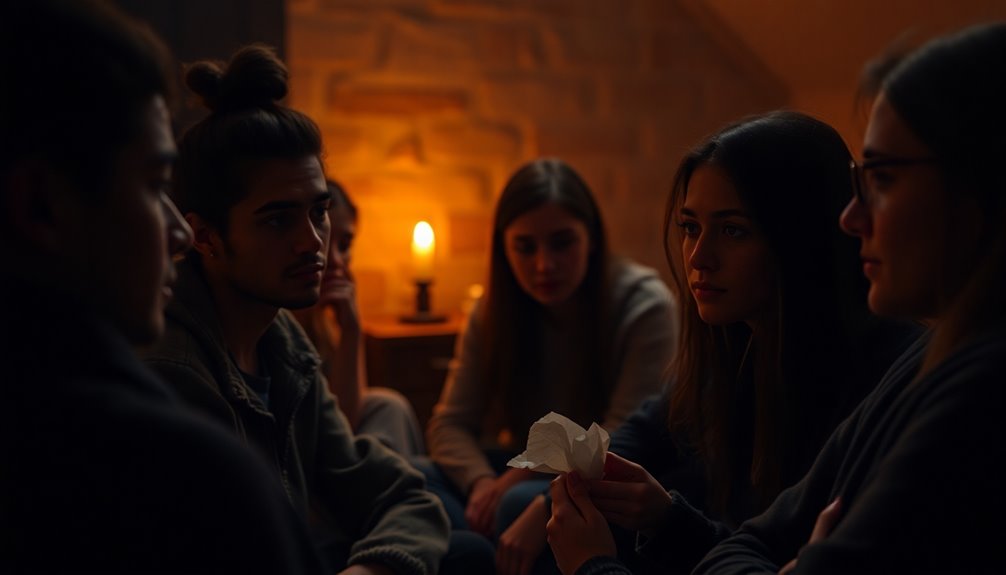If you loved *Manchester by the Sea*, you’ll want to explore films that capture intense emotional journeys. *Short Term 12* navigates trauma in a group home, while *Ordinary People* portrays a family’s struggle with grief. *Reign Over Me* shows the weight of loss and the healing power of friendship. *Captain Fantastic* explores parenting through grief, and *You Can Count on Me* highlights sibling dynamics. Don’t miss the poignant reflections in *Aftersun* and the raw heartbreak of *Blue Valentine*. Keep going to discover even more impactful choices!
Key Takeaways
- Films like *Ordinary People* and *Reign Over Me* explore deep emotional themes of grief and healing, resonating with audiences on a personal level.
- *Short Term 12* and *You Can Count on Me* focus on complex relationships and personal redemption, highlighting the impact of trauma and familial bonds.
- *Captain Fantastic* examines parenting amidst loss, emphasizing resilience and the struggle between ideals and societal expectations in the face of grief.
- *Aftersun* captures the nostalgia of father-daughter relationships, intertwining themes of memory and reflection, making the emotional struggles relatable and impactful.
- *Blue Valentine* presents a raw portrayal of love and heartbreak, showcasing the complexities of relationships through non-linear storytelling that leaves a lasting impression.
Short Term 12 (2013)

*Short Term 12* (2013) offers a poignant glimpse into the lives of troubled teenagers living in a group home.
You’ll witness emotional turmoil as characters like Grace, portrayed by Brie Larson, navigate their own grief while supporting others.
The film’s exploration of personal redemption shines through the harrowing stories shared by residents, particularly Jayden’s impactful narrative.
Each interaction highlights the complexities of trauma, revealing how deeply interconnected the staff and youth are in their struggles.
This raw and realistic portrayal draws you into their world, evoking empathy for those facing mental health challenges.
As you watch, you’ll find yourself reflecting on loss and the resilience of the human spirit, making *Short Term 12* an unforgettable emotional journey. Additionally, the film powerfully illustrates the importance of environmental interactions in shaping individual development and coping mechanisms.
Ordinary People (1980)

In “Ordinary People,” you see how grief can fracture family dynamics, especially as Conrad struggles with guilt after losing his brother.
The emotional confrontation between him and his mother really highlights their different coping mechanisms.
This film powerfully illustrates the healing process, making it a touchstone for anyone grappling with loss. Moreover, the journey through grief can lead to a deeper understanding of emotional intelligence, fostering connections with others who share similar experiences.
Family Dynamics and Grief
As the Jarrett family grapples with the tragic death of their eldest son, Buck, “Ordinary People” exposes the deep fissures that grief can create within family dynamics. You witness emotional depth as Conrad struggles with guilt and feelings of inadequacy, trying to meet his family’s expectations. His relationship with his mother, Beth, highlights the complexities of love and communication in the wake of personal loss. This film’s portrayal of mental health issues, particularly Conrad’s attempted suicide, emphasizes how grief profoundly affects both family members and their relationships. Additionally, the film showcases the importance of open communication in navigating the challenges that arise from personal tragedy.
| Family Member | Role in Grief Process |
|---|---|
| Conrad | Struggles with guilt |
| Beth | Avoids emotional expression |
| Father | Caught in the middle |
Guilt and Healing Process
While grappling with the aftermath of his brother’s death, Conrad’s journey through guilt in “Ordinary People” reveals how deeply trauma can affect the healing process.
You witness how his overwhelming feelings of guilt impede not only his recovery but also the dynamics within his family. As they struggle to communicate, you see the fractures forming in their relationships, emphasizing the destructive nature of unresolved emotions.
This struggle highlights how guilt can linger and create barriers to healing. The film poignantly illustrates that acknowledging these feelings is vital for progress.
Ultimately, Conrad’s path toward healing showcases the importance of confronting grief and guilt, urging viewers to recognize that facing these emotions is essential in any family’s journey toward recovery. Moreover, the impact of emotional manipulation in relationships can exacerbate feelings of guilt and hinder the healing process.
Emotional Confrontation Scenes
Confronting deep-seated emotions is pivotal in “Ordinary People,” particularly during the intense scene between Conrad and his mother, Beth. This confrontation lays bare their unresolved grief and the emotional turmoil stemming from their son Buck’s tragic death. You feel the profound exploration of their strained relationship, showcasing the impact of past trauma on family dynamics. The authenticity of the performances captures the complexities of love and loss, allowing you to empathize deeply with their pain. Additionally, the film’s portrayal of resilience and perseverance reflects the core life lessons that can inspire personal transformation.
| Emotion | Impact on Characters |
|---|---|
| Guilt | Conrad’s internal struggle |
| Anger | Beth’s denial and resentment |
| Sadness | Shared grief |
| Isolation | Conrad’s loneliness |
| Hope | A chance for healing |
Reign Over Me (2007)

“Reign Over Me” (2007) offers a poignant exploration of grief and healing, centered on Charlie Fineman, portrayed by Adam Sandler. After losing his family in the 9/11 attacks, Charlie grapples with profound grief that isolates him from the world.
The film beautifully portrays his journey as he reconnects with his college roommate, Alan Johnson, played by Don Cheadle. Their friendship becomes a lifeline, showcasing the power of human connection in overcoming sorrow.
A particularly moving scene features Charlie opening up about his loss, highlighting Sandler’s powerful performances and emotional depth. This narrative resonates with the challenges of emotional dysregulation faced by individuals dealing with profound loss and trauma.
Directed by Mike Binder, “Reign Over Me” authentically captures the struggles of recovery, reminding us of the resilience needed to heal amidst overwhelming pain.
Captain Fantastic (2016)

When faced with the challenges of parenting after loss, “Captain Fantastic” (2016) offers a compelling narrative that explores deep into grief and resilience.
You’ll witness Ben Cash, portrayed by Viggo Mortensen, as he navigates parental responsibility while raising his six children in the wilderness. This poignant exploration of family dynamics raises crucial questions about love and sacrifice.
Here are four key themes you’ll encounter:
- The struggle between ideals and societal norms.
- The impact of grief on everyday life.
- The definition of home and identity.
- The bonds of family strengthened through adversity.
As you watch, you’ll appreciate the film’s heartfelt storytelling and the profound questions it raises about what it means to be a parent. Additionally, the film’s exploration of resilience parallels the benefits of engaging in physical activity for emotional well-being, highlighting how such practices can aid in coping with loss.
You Can Count on Me (2000)

In “You Can Count on Me,” you see the complex dynamics of family as siblings Sammy and Terry confront their past and present struggles. This film takes you on an emotional growth journey, highlighting how their relationship shapes their choices. With powerful performances from Laura Linney and Mark Ruffalo, it captures the essence of forgiveness and redemption. The film’s exploration of emotional growth resonates deeply, reminding viewers of the importance of personal connections in navigating life’s challenges.
Family Dynamics Explored
Although family bonds can be both a source of strength and a source of conflict, “You Can Count on Me” deftly explores these complexities through the relationship between siblings Sammy and Terry.
Their journey highlights the intricate family dynamics that many can relate to. As they navigate their complex bond, you’ll notice how:
- Past decisions shape present relationships.
- Forgiveness can be both uplifting and burdensome.
- Differences in responsibilities create tension.
- Emotional clashes reflect deeper issues.
The film captures the raw essence of sibling relationships, showcasing their struggles and triumphs.
This authentic portrayal resonates with audiences, reminding you of the challenges and love that come with familial ties. Ultimately, it’s a profound look at emotional growth amid life’s unpredictability, emphasizing the importance of strong communication skills in nurturing relationships.
Emotional Growth Journey
As Sammy and Terry navigate their complicated relationship, you witness their emotional growth journey unfold in “You Can Count on Me.”
The film captures their struggles and transformations, emphasizing how personal challenges and reconciliation efforts can reshape familial bonds. Through the deeply immersive storytelling, you experience the complexities of human emotions as they confront their past and present.
Sammy’s stable life contrasts sharply with Terry’s chaotic existence, highlighting the differing responsibilities they face. Their journey reveals how forgiveness and understanding can lead to profound changes, allowing both siblings to redefine their relationship.
This authentic portrayal of sibling dynamics resonates, showcasing resilience and redemption, making it a compelling watch for anyone who values emotional depth in storytelling. Additionally, the film illustrates how recognizing signs of stagnation is crucial for initiating change in relationships.
Aftersun (2022)

While you immerse yourself in *Aftersun* (2022), you’ll find a poignant exploration of a father-daughter relationship set against the backdrop of a past vacation. This film investigates deep into their bond, revealing the complexities and struggles they face.
You’ll appreciate how it:
- Captures nostalgia through evocative cinematography.
- Offers compelling performances that make the emotional struggles palpable.
- Explores themes of memory and reflection, intertwining childhood perceptions with adult realizations.
- Resonates with audiences by examining love and loss in a relatable manner.
Directed by Charlotte Wells, *Aftersun* paints an intimate portrait of grief and familial connections, making it a fitting companion to emotionally impactful dramas like *Manchester by the Sea*.
Blue Valentine (2010)

In *Blue Valentine* (2010), you witness the raw reality of love as it navigates the highs and lows of a romantic relationship. This poignant film, featuring outstanding performances by Ryan Gosling and Michelle Williams, takes you through the complexities of intimacy and heartbreak. The non-linear narrative highlights the enduring impact of memories, regrets, and the bittersweet nature of love.
| Theme | Impact |
|---|---|
| Love | Complex and multifaceted |
| Heartbreak | Painful yet relatable |
| Memory | Haunting and vivid |
| Regret | Personal and profound |
Directed by Derek Cianfrance, *Blue Valentine* offers a powerful exploration of romantic struggles, making it a must-watch for those seeking emotional depth.
Frequently Asked Questions
What to Watch if You Like Manchester by the Sea?
If you like Manchester by the Sea, you should check out Ordinary People for its deep exploration of grief and family dynamics.
You’ll also find You Can Count on Me enthralling, as it investigates sibling relationships.
Blue Valentine offers a raw look at love’s decline, while The Hours presents profound personal struggles.
Finally, The Sweet Hereafter addresses collective grief, making these films emotionally resonate in ways similar to Manchester by the Sea.
Is Manchester by the Sea About Mental Illness?
Absolutely, “Manchester by the Sea” dives deep into mental illness like few films ever could.
You’ll witness how grief consumes Lee Chandler, showcasing the raw, painful impact of unresolved trauma on his mental health.
As you follow his journey, you’ll see the complexities of depression and isolation unfold, revealing how his emotional struggles affect every relationship.
It’s a haunting portrayal that emphasizes the importance of confronting one’s past to begin healing.
Was Matt Damon Supposed to Be in Manchester by the Sea?
Yes, Matt Damon was originally set to star in “Manchester by the Sea” as the lead character, Lee Chandler.
However, he eventually stepped away from the role, allowing Casey Affleck to take on the part.
Damon didn’t leave the project entirely, as he remained a producer and helped shape Kenneth Lonergan’s vision.
He’s expressed admiration for Affleck’s performance and the film’s emotional depth, even if he wasn’t in front of the camera.
What Does Lee Mean When He Says “I Can’t Beat It”?
When Lee says, “I can’t beat it,” you realize he’s grappling with profound grief and guilt.
It’s like standing in a storm, feeling the weight of loss pressing down on you. He can’t escape the memories of his past tragedy, and you sense the emotional paralysis that grips him.
This phrase captures his struggle, revealing how unresolved pain shapes his identity and isolates him from others, making it hard to move forward.
Conclusion
In the end, these heart-stopping dramas remind us that “life isn’t about waiting for the storm to pass, but learning to dance in the rain.” Each film on this list, like *Manchester by the Sea*, captures the rawness of human emotion and the beauty of resilience. So grab some popcorn, settle in, and let these powerful stories resonate with you. They’ll stay with you long after the credits roll, touching your heart in ways you never expected.









